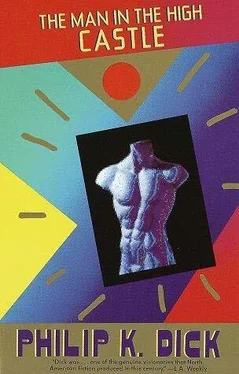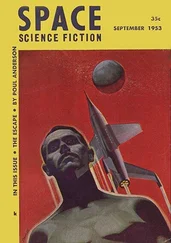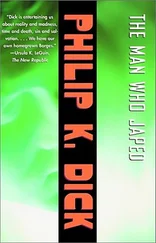“What is that?” Mr. Baynes said to Mr. Tagomi.
“Old poem,” Mr. Tagomi said. “Middle Tokugawa Period.”
Mr. Kotomichi said, “As the spring rains fall, soaking in them, on the roof, is a child’s rag ball.”
As Frank Frink watched his ex-employer waddle down the corridor and into the main work area of W-M Corporation he thought to himself, The strange thing about Wyndam-Matson is that he does not look like a man who owns a factory. He looks like a Tenderloin bum, a wino, who has been given a bath, new clothes, a shave, haircut, shot of vitamins, and set out into the world with five dollars to find a new life. The old man had a weak, shifty, nervous, even ingratiating manner, as if he regarded everyone as a potential enemy stronger than he, whom he had to fawn on and pacify. “They’re going to get me,” his manner seemed to say.
And yet old W-M was really very powerful. He owned controlling interests in a variety of enterprises, speculations, real estate. As well as the W-M Corporation factory.
Following after the old man, Frink pushed open the big metal door to the main work area. The rumble of machinery, which he had heard around him every day for so long—sight of men at the machines, air filled with flash of light, waste dust, movement. There went the old man. Frink increased his pace.
“Hey, Mr. W-M!” he called.
The old man had stopped by the hairy-armed shop foreman, Ed McCarthy. Both of them glanced up as Frink came toward them.
Moistening his lips nervously, Wyndam-Matson said, “I’m sorry, Frank; I can’t do anything about taking you back. I’ve already gone ahead and hired someone to take your place, thinking you weren’t coming back. After what you said.” His small round eyes flickered with what Frink knew to be an almost hereditary evasiveness. It was in the old man’s blood.
Frink said, “I came for my tools. Nothing else.” His own voice, he was glad to hear, was firm, even harsh.
“Well, let’s see,” W-M mumbled, obviously hazy in his own mind as to the status of Frink’s tools. To Ed McCarthy he said, “I think that would be in your department, Ed. Maybe you can fix Frank here up. I have other business.” He glanced at his pocket watch. “Listen, Ed. I’ll discuss that invoice later; I have to run along.” He patted Ed McCarthy on the arm and then trotted off, not looking back.
Ed McCarthy and Frink stood together.
“You came to get your job back,” McCarthy said after a time.
“Yes,” Frink said.
“I was proud of what you said yesterday.”
“So was I,” Frink said. “But—Christ, I can’t work it out anywhere else.” He felt defeated and hopeless. “You know that.” The two of them had, in the past, often talked over their problems.
McCarthy said, “I don’t know that. You”re as good with that flex-cable machine as anybody on the Coast. I’ve seen you whip out a piece in five minutes, including the rouge polishing. All the way from the rough Cratex. And except for the welding—”
“I never said I could weld,” Frink said.
“Did you ever think of going into business on your own?”
Frink, taken by surprise, stammered, “What doing?”
“Jewelry.”
“Aw, for Christ’s sake!”
“Custom, original pieces, not commercial.” McCarthy beckoned him over to a corner of the shop, away from the noise. “For about two thousand bucks you could set up a little basement or garage shop. One time I drew up designs for women’s earrings and pendants. You remember—real modern contemporary.” Taking scratch paper, he began to draw, slowly, grimly.
Peering over his shoulder, Frink saw a bracelet design, an abstract with flowing lines. “Is there a market?” All he had ever seen were the traditional—even antique—objects from the past. “Nobody wants contemporary American; there isn’t any such thing, not since the war.”
“Create a market,” McCarthy said, with an angry grimace.
“You mean sell it myself?”
“Take it into retail shops. Like that—what’s it called? On Montgomery Street, that big ritzy art object place.”
“American Artistic Handcrafts,” Frink said. He never went into fashionable, expensive stores such as that. Few Americans did; it was the Japanese who had the money to buy from such places.
“You know what retailers like that are selling?” McCarthy said. “And getting a fortune for? Those goddam silver belt buckles from New Mexico that the Indians make. Those goddam tourist trash pieces, all alike. Supposedly native art.”
For a long time Frink regarded McCarthy. “I know what else they sell,” he said finally. “And so do you.”
“Yes,” McCarthy said.
They both knew—because they had both been directly involved, and for a long time.
W-M Corporation’s stated legal business consisted in turning out wrought-iron staircases, railings, fireplaces, and ornaments for new apartment buildings, all on a mass basis, from standard designs. For a new forty-unit building the same piece would be executed forty times in a row. Ostensibly, W-M Corporation was an iron foundry. But in addition, it maintained another business from which its real profits were derived.
Using an elaborate variety of tools, materials, and machines, W-M Corporation turned out a constant flow of forgeries of pre-war American artifacts. These forgeries were cautiously but expertly fed into the wholesale art object market, to join the genuine objects collected throughout the continent. As in the stamp and coin business, no one could possibly estimate the percentage of forgeries in circulation. And no one—especially the dealers and the collectors themselves—wanted to.
When Frink had quit, there lay half-finished on his bench a Colt revolver of the Frontier period; he had made the molds himself, done the casting, and had been busy handsmoothing the pieces. There was an unlimited market for small arms of the American Civil War and Frontier period; W-M Corporation could sell all that Frink could turn out. It was his specialty.
Walking slowly over to his bench, Frink picked up the still-rough and burred ramrod of the revolver. Another three days and the gun would be finished. Yes, he thought, it was good work. An expert could have told the difference… but the Japanese collectors weren’t authorities in the proper sense, had no standards or tests by which to judge.
In fact, as far as he knew, it had never occurred to them to ask themselves if the so-called historic art objects for sale in West Coast shops were genuine. Perhaps someday they would… and then the bubble would burst, the market would collapse even for the authentic pieces. A Gresham’s Law: the fakes would undermine the value of the real. And that no doubt was the motive for the failure to investigate; after all, everyone was happy. The factories, here and there in the various cities, which turned out the pieces, they made their profits. The wholesalers passed them on, and the dealers displayed and advertised them. The collectors shelled out their money and carried their purchases happily home, to impress their associates, friends, and mistresses.
Like postwar boodle paper money, it was fine until questioned. Nobody was hurt—until the day of reckoning. And then everyone, equally, would be ruined. But meanwhile, nobody talked about it, even the men who earned their living turning out the forgeries; they shut their own minds to what they made, kept their attention on the mere technical problems.
“How long since you tried to do original designing?” McCarthy asked.
Frink shrugged. “Years. I can copy accurately as hell. But—”
“You know what I think? I think you’ve picked up the Nazi idea that Jews can’t create. That they can only imitate and sell. Middlemen.” He fixed his merciless scrutiny on Frink.
Читать дальше










